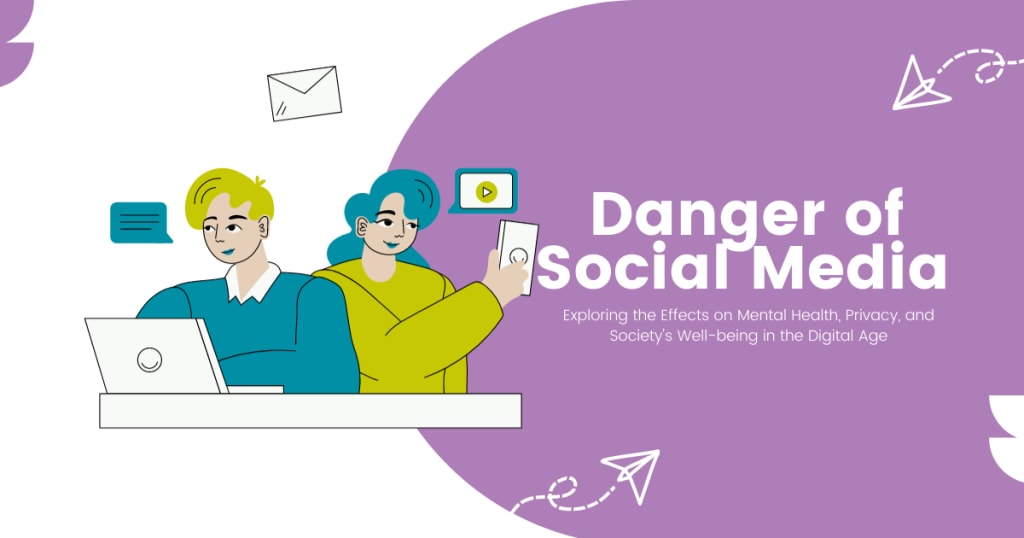Unveiling the Dark Side of Social Media: Understanding the Dangers and Impacts
Exploring the Effects on Mental Health, Privacy, and Society's Well-being in the Digital Age

Introduction:
The digital revolution has revolutionized the very fabric of our social fabric, completely transforming the way we communicate, connect, and consume information.
While it has revolutionized our lives in many ways, it is essential to recognize the potential dangers and negative impacts associated with excessive social media use.
In this article, we will delve into the darker side of social media and explore its effects on mental health, privacy, and society as a whole.
By shedding light on these issues, we can develop a deeper understanding of the risks involved and make more informed decisions about our online behavior.
The Mental Health Toll of Social Media:
The impact of social media on mental health is a double-edged sword, as these platforms have the potential to both uplift and undermine our well-being.
We will discuss the prevalence of social media addiction, its links to anxiety and depression, and the negative consequences of constant comparison and unrealistic expectations.
Drawing from research studies and real-life examples, we will highlight the importance of digital well-being and offer practical tips for maintaining a healthy relationship with social media.
Privacy Concerns and Data Exploitation:
The vast amount of personal data shared on social media raises significant privacy concerns.
We will explore how social media platforms collect, store, and utilize user data, often for targeted advertising and other purposes.
We will discuss the risks of data breaches, identity theft, and the potential consequences of oversharing personal information.
By understanding these privacy risks, individuals can take proactive steps to protect their online privacy and safeguard their personal data.
Cyberbullying and Online Harassment:
The rise of social media platforms has unfortunately given rise to a darker side of online interactions, turning them into breeding grounds for cyberbullying and rampant online harassment.
We will examine the alarming rise of digital abuse, its impact on victims, and the long-term psychological effects.
By sharing real-life stories, we will highlight the importance of creating safe and inclusive online spaces and implementing effective measures to combat cyberbullying.
Spread of Misinformation and Fake News:
The rapid spread of misinformation and fake news through social media poses a threat to public discourse and democratic processes.
We will explore the mechanisms behind the dissemination of false information, such as algorithms and echo chambers, and discuss the societal implications.
Additionally, we will emphasize the importance of media literacy and critical thinking skills in combating the spread of misinformation.
Social Media's Impact on Relationships and Social Dynamics:
Social media has reshaped the way we interact and form relationships.
We will examine the potential negative impacts, including the erosion of genuine human connection, the rise of online bullying, and the pressures of maintaining a curated online persona.
Addressing the Dangers: Navigating Social Media Mindfully:
In this section, we will provide practical tips and strategies for using social media responsibly and mitigating the associated risks.
We will discuss techniques for managing screen time, setting boundaries, cultivating a positive online environment, and protecting privacy.
By incorporating these practices into our digital lives, we can harness the benefits of social media while minimizing its negative impacts.
Set Boundaries:
Establishing boundaries is vital for maintaining a healthy relationship with social media.
Define specific limits on your screen time and establish designated periods for disconnecting from social media.
Create a balance between your virtual life and real-life experiences. Prioritize offline activities, relationships, and self-care.
Be Mindful of Online Interactions:
In online interactions, exercise empathy, respect, and kindness. Be aware of the impact your words and actions may have on others.
Take Breaks When Needed:
Lastly, listen to your inner voice and recognize when it's time to take a break from social media.
If you find yourself feeling overwhelmed, anxious, or constantly comparing yourself to others, it may be a sign to step back.
Prioritize your mental well-being and take the necessary time to recharge and rejuvenate.
Conclusion:
As we navigate the complex landscape of social media, it is crucial to recognize and understand the dangers it presents.
By acknowledging the effects of social media on mental health, privacy, and society, we can approach these platforms with greater mindfulness and responsibility.
By cultivating a healthy relationship with social media, setting boundaries, prioritizing mental well-being, and promoting digital empathy, we can navigate the digital age more safely and reap the benefits while mitigating the risks.
It is up to individuals, communities, and platform developers to collectively work towards a healthier and more positive social media environment.
About the Creator
Evelyn Taylor
A front-end enthusiast and dedicated development engineer, eager to expand knowledge on development techniques and collaborate with others to build exceptional software solutions.






Comments
There are no comments for this story
Be the first to respond and start the conversation.